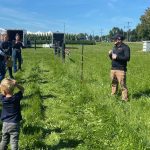CP Rail is fighting to clear its name.
It has decided it would rather spend weeks as the sole accused villain in a high profile hearing than make a dishonorable peace, says Rick Sallee, CP vice-president for grain and coal.
“We’re really concerned, because our reputation is at stake,” said Sallee, who along with about 25 other senior CP officials has spent weeks in Saskatoon fighting with the Canadian Wheat Board at a Canadian Transportation Agency hearing.
The board accuses CP of costing farmers millions of dollars in the winter of 1996-97 by not providing adequate service and treating grain unfairly compared to other commodities.
Read Also

Agri-business and farms front and centre for Alberta’s Open Farm Days
Open Farm Days continues to enjoy success in its 14th year running, as Alberta farms and agri-businesses were showcased to increase awareness on how food gets to the dinner plate.
Sallee said CP is committed to vindicating its name and “to make sure the truth is out there.”
CP has been left to face all the CWB’s allegations after the board and CN reached an out-of-court settlement. CP had asked for the case against it to be thrown out because of the settlement, but the transport agency ordered the hearing to continue.
By the end of the week Sallee seemed eager to proceed.
“If we do our defence well, we’ll consider it a success, no matter what the decision is,” he said in an interview.
Sallee said he is glad to see the wheat board’s case wrapping up, because CP will soon be able to make what he considers a convincing defence.
The best defence
It will show that 1996-97 was one of the worst winters in this century, with a series of weather disasters that made CP’s job extremely difficult.
“We were ready for a normally severe Canadian winter,” said Sallee. “We were not ready for a total shutdown.”
Blizzards, avalanches and derailments followed in quick succession in both the West and the East, crippling shipments, he said.
CP wants to show it was reasonable in its efforts to reopen rail lines and that its crews performed near heroic feats in getting some lines cleared as quickly as they did.
Sallee said CP had been willing to consider a settlement until CN made its deal with the wheat board, but after seeing the deal interpreted by some as a guilty plea by CN, CP decided to fight to prove innocence.
Sallee said CP gets 25 percent of its revenue from grain shipments and can’t afford to treat grain shippers unfairly.
“For me to hear that I’m going around trying to screw farmers is very upsetting,” said Sallee.
Once CP is given a chance to defend itself, Sallee is confident the problems of 1996-97 will be seen as regrettable acts of God, not discriminatory treatment.
“There’s no doubt we had a major gap in our service. The question is why.”














